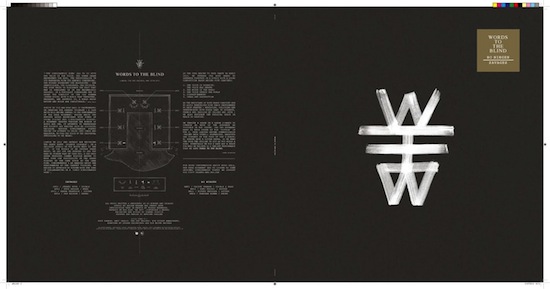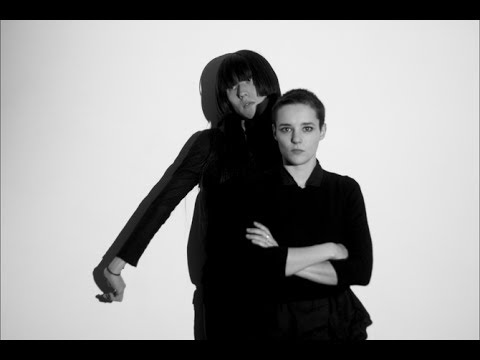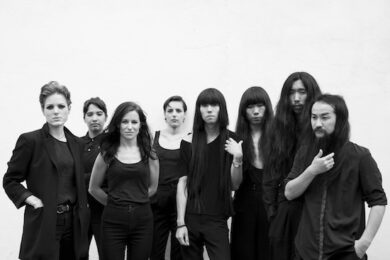Photograph courtesy of Simona Mizzoni
The fact that Taigen Kawabe and Jehnny Beth are friends is both entirely predictable and completely satisfying. They are both imposing at first, with their dark hair and excellent facial bones, but they spark off one another; polite, interested and giggling during their discussion of touring and writing schedules. Taigen is about to head back to Japan for a little break ("To see my dentist and my girlfriend") before months of global touring with Kasabian and then Band Of Skulls. Jehnny is writing with Savages in the hope of a 2015 album release.
We meet at a cafe in Clapton to discuss their Words To The Blind project: a live recording of the joint performance their bands gave at London’s Red Gallery last year and released this week. The two groups united on stage to dabble in a spot of simultaneous poetry, the Dadaist concept of sonic nonsense. Dada may not mean anything but Words To The Blind means, to these two, an opportunity to explore musical spaces, minus the commercial demands of a studio album.
The piece is a forty-minute flight through acidic guitarscapes and bi-lingual hymns and while the narrative is relatively simple, the musicianship is apparent and the inspiration suitably surreal. The juxtapositions within are executed with a deftness that could only come from two of London’s most thoughtful bands and today, I feel like a tit, trying to curate a conversation between two of the smartest musicians I’ve met.
How did you guys first meet then?
Taigen Kawabe: Probably six years ago? Five years ago? There was a festival hosted by British Sea Power in…
Jehnny Beth: Tan Hill! The highest pub in the land, in North Yorkshire. I came to talk to you because I really liked your show and I was impressed. Hearing Bo Ningen in a pub in Tan Hill, the contrast was quite big.
I remember Gemma [Thompson, Savages guitarist] telling the story of when you were soundchecking and she went into the room to listen and there was a baby lamb in the room. As soon as you started playing guitar the lamb went out of the bar.
That’s quite a good test for a band: to see how long the lamb stays in the room.
JB: [laughs] It was a really odd context. But that’s what British Sea Power are good at – putting bands together. Just good music in a weird, English context.
Since then I went to see more Bo Ningen shows. I filmed them with my shit camera. I just wanted to document them. I was inspired by what they were showing on stage: their intensity. Savages didn’t exist at the time and I think it kind of stayed in my mind because I was impressed… it was rare to see a band that would put on such a show and really scare you. You didn’t know if you were going to end up with a guitar in your face or not and that’s the feeling you want from rock music. You want it to be sexy and scary. I became a bit of a fan really!
So by the time you got to thinking about working with each other, was that pre or post the birth of Savages?
JB: It was when Taigen came to my house we did some recordings for ‘Nichijyou’ [collaborative 2013 single], about a year and a half ago.
TK: After she formed Savages, we were looking for the guest vocal for the single at the time. That was a really nice way to collaborate because there was nothing pushing us too much towards each other.
JB: It was easy.
TK: It was really easy. We really loved the resulting sound of the song. We were thinking about a future collaboration… and I’m not sure who started it but we began to think about a collaboration as two whole bands.
JB: It was Johnny Hostile [one half of John & Jehn and co-founder of the Pop Noire label] – the three of us were having dinner together and he said, what would be a crazy idea is putting the two loudest bands of London in the same room and seeing what happens.
So there wasn’t any clashing?
JB: I think Bo Ningen have a very instinctive way of working with their music which makes it really easy for an outsider. They’re open to suggestions and among themselves it’s quite fluid.
TK: I think that’s because of how we make music: it’s not one guy from the band that brings everything. We four play at the same time and we record everything.
JB: I mean when you do collaboration you know why you’re asking people to join you and it’s because there’s something of them you like and you want them to be themselves in that environment that you provide for them.
So how did Words To The Blind come about?
JB: The idea that Johnny had kind of merged into our heads and we thought it would be a good idea. Gemma was reading about Dadaist history at the time. She thought that the idea would be a good way to use that tradition of simultaneous poetry and to turn it into our own thing. We speak three different languages in the two bands – Japanese, French and English – which was good because simultaneous poetry is supposed to be poetry in different languages recited at the same time.
Then there was this imagining that we’d have five chapters that were based around the idea of the singular voice and the noise of the world. Would there be a battle between the two? Between the single and then the group? Or would there be suddenly a union and a harmony? That was the evolution. And then there was the chaos.
So we worked on simple ideas like that – then we rehearsed with five chapter names on the board. The first was "the voice": Taigen and I speaking in Japanese and French. The second was "the world is rising" or something like that. Then there was "the battle". So we structured it simply like that, then we formed it over a number of days.
How malleable were things within those chapters?
JB: We had some cues. We really wanted a battle between Savages and Bo Ningen, so we needed to find a way to bring that into the context of the thing we were creating. It was the most extreme thing I’ve ever played I think.
Because the stage is shaped as a ‘U’ and the audience is in the middle, there’s this moment where Savages is in silence and Bo Ningen are being the loudest they can be and then suddenly the opposite is happening. It creates… I don’t know. I’ve never experienced something like that ever. It’s almost grindcore, you know? It’s absolutely extreme.
Is there a reason it’s called an album?
JB: I never wanted it to be called an album, but I think it’s gone through anyway. I think we should call it an LP or a project…
TK: I’m the same as Jehnny, I don’t think it’s an album. It’s a live recording. Some people might think it’s a live album rather than a studio-recorded album… but it doesn’t really matter to me, I wanna just make it open for everyone. If they think it’s an art performance then it is. If they think it’s a studio album –
JB: Well it’s not a studio album!
TK: In some parts it sounds like a studio album!
JB: Well, yeah. It’s really well-recorded.
I listened to it in this cafe, which was a bad idea. Where should I listen?
TK: For our recordings, I normally say I want people to listen everywhere. On a train, on an aeroplane, at home… because not only the sound system or location differs, [but] your mood or your house or whatever might change the perception of the music. But for this one it’s a bit different. Because it is a performance.
JB: You need time. You need 38 minutes – so wherever you can find that in your life I suppose.
So you want it to be a full, no-pausing experience?
JB: Well I mean, you can. It’s mixed in stereo as well. Bo Ningen are on the right. That was a choice by Johnny. He really wanted to recreate what the live experience was like, except on a few moments where the guitars maybe melt and it becomes a bit more central.
I adore the cover art. You’ve also included a few pieces of information…
JB: It’s by Antoine Carlier; he’s one of my partners on the label and he did all the Savages artwork. He took the letters ‘WTTB’ and made it into a brush logo which he did by hand. And then on the back, Gemma really wanted to have a written explanation of what the project was about and also a diagram so people could see the position of the musicians and how it was recorded.
TK: That doesn’t exist any more does it? It’s like a Robert Fripp or Brian Eno-kind of record, with an explanation of how the music should be listened to.

JB: Yeah, it shows you the process. It’s a project that is so around a concept, so it’s nice to be able to explain it so people perhaps have more enjoyment after. And going from the recording to the reading, you can imagine where everyone is and listen to it; almost like a game.
TK: You can have numerous ways of enjoying it, and it allows for you to change your perception of it afterwards or before.
Are you similar ages? Do you share any generational touchstones?
JB: Yeah we are… that’s an interesting question.
TK: I am not sure if we share musical links…
JB: When you play me some Japanese pop songs, that’s really good. That’s something very exotic for me.
Are you more connected by obscure bands you like than pop music, because you grew up on opposite sides of the world?
JB: I think so.
TK: Some J-pop is really straightforward, which I don’t really like. But there are some obscure records in the chart: some unexpected phenomena. But now that I live in the UK, I don’t feel like I get anything from British pop music. I want to make the opposite: complicated and twisted stuff.
JB: I listen to every kind of genre, but probably, when it comes to things we have in common… I think what attracted me to Bo Ningen was their performance and the energy they put into it. We both get deeply and completely involved in that thing.
The question about age is interesting to me though. One of the reasons I really wanted that project to happen was… because it’s really nice when shit happens, you know? People always have these crazy ideas but never do them because it costs money, because it takes a lot of time. It took us maybe a year and a half for us to manage to release Words To The Blind, because you’ve got two bands on tour releasing records at different times, along with two different sets of management and two different labels. I mean that’s a nightmare to organise. But I’m really glad we did it, I can’t even believe we did it. So it’s really nice to concretise something.
I think less and less bands don’t have the opportunity, at our level anyway, to do projects that are purely artistic because of all the constraints. It’s harder to make a living out of this. And so, in that sense we made something that I think is quite rare nowadays. And I think bands should spend more time doing things like that, rather than chasing their careers so much.
Is there anything in French or Japanese that you say during the performance that you’d be able to talk me through?
JB: The French text I say at the beginning is from a Thomas Bernhard play called Au but. One of the characters is an old woman who talks about youth. Bernhard was really appalled by the youth of his time and how they were not rebellious enough. So his character of the old woman was voicing that, and saying to a young playwright that he talks about rebellion but he doesn’t actually do it. And he has limitations in what he is and what he can do.
She thinks that the purpose of youth should be to be rebellious and should be to wipe out history and start something completely new. And that’s something I always thought was true.
It’s a really intense text that was really badly received when he wrote it. The idea of the youth that has a purpose and has a goal… in society we need a youth that is changing things, otherwise we get stuck.
So is it a rallying cry? Or are you thinking about you being in the position of the playwright?
JB: I was just happy to be able to say this message through a project we were doing. Do I have the same limitations as the playwright that the character is talking to? Maybe. But I still like the idea of two bands, the same age as we are, having this intention of doing something that is probably not money-making and is just for the art only. So I thought adding this text fitted really well.
Are you planning on taking it elsewhere?
JB: We’d love to, yeah. I’m trying to find a way to play it in Paris and we’re in touch with MoMA PS1 in New York. But we’re under no pressure to do anything, which is good. I’d love if it were something we still played when we were 80. We’d say, "Oh, let’s do another Words To The Blind and it would be different at the time. It would evolve.
Words To The Blind is out now on Pop Noire/Stolen Recordings. Savages and Bo Ningen play Oval Space in London tonight and Le Guess Who? festival in Utrecht, Netherlands on Friday, November 21




